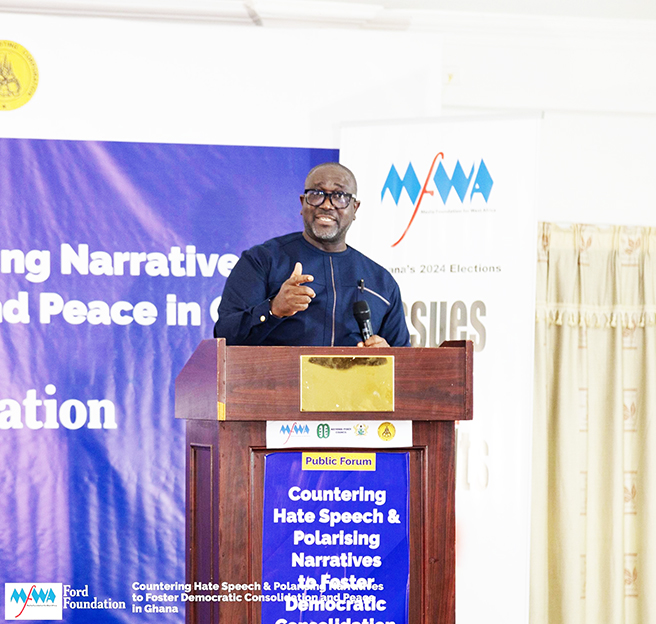The National Media Commission (NMC) has advised political parties to desist from promoting hate speech to fuel chaos.The call was made by the Executive Secretary of the NMC, George Sarpong, in his keynote address at the public forum on countering hate speech, held in Accra yesterday.
The forum was organised by the Media Foundation for West Africa (MFWA), in partnership with National Peace Council, Ghana, National Commission for Civic Education, National Media Commission and funding support from the Ford Foundation.
Addressing the impact of political leaders emphasising ethnic or regional identities over national identity, Sarpong warned, “When political leaders emphasise ethnic or regional identities over national identity, it leads to a breakdown in social cohesion, making it difficult to build a unified democratic state.”
He stressed that such practices hinder the development of a cohesive national identity essential for democratic consolidation.
Mr. George Sarpong underscored the destructive potential of discriminatory communication.
“Any communication that belittles or discriminates against individuals or groups based on attributes such as race, religion, ethnicity or gender is a recipe for chaos,” he said, urging participants to consider the broader implications of their words and actions.
Mr. Sarpong also highlighted the dangers of polarising narratives and the importance of fostering a unified national identity.
“Those who disseminate polarising narratives always believe they act with good intentions, such as Christian groups, Muslims and Traditionalists who label the gay community with unprintable words, feeling a sense of righteousness in doing so,” Sarpong stated.
He emphasised that such actions, despite being perceived as righteous, contribute significantly to societal division and intolerance.
Mr. Sarpong pointed out the inconsistency in promoting intolerance in one area, while advocating for tolerance in another.
“The challenge is that you cannot display intolerance in matters of your religious interest and turn around to preach tolerance to politicians in matters of their interest,” he remarked, highlighting the need for a consistent approach to tolerance across all sectors of society.
“Any discourse that deepens divisions within society by emphasising differences and fostering an ‘us versus them’ mentality sets society on a slippery slope into hell,” he cautioned.
Mr. Sulemana Braimah, Executive Director of the MFWA, in his welcome remarks acknowledged the significant milestone of Ghana’s democratic journey.
“This year marks 31 years of our democracy, when we transitioned from military rule to constitutional governance. And this year we do have an election coming up in December, and this election will be the ninth successive one since we transitioned from military government to civilian government,” he noted.
He emphasised the importance of reflecting on and improving democratic practices in the face of challenges such as hate speech and disinformation.
“The need for such reflections on peace and democratic consolidation in Ghana have even become more critical given the overwhelming evidence around the world and particularly in West Africa, about democratic recession,” Mr Braimah stated.
Highlighting the increasing scope of disinformation campaigns, Mr. Braimah cited a report by the Africa Center for Strategic Studies, which identified West Africa as a major target. “According to a recent report by the Africa Centre for Strategic Studies…there were as many as 72 campaigns targeting 13 West African countries, including Ghana,” he explained.
Mr. Braimah identified several factors contributing to the problem in Ghana, including a polarised political environment and a highly partisan media landscape.
Despite the challenges, Mr. Braimah expressed hope and called for collective action. “I am not saying all this to scare us or to portray a very hopeless situation.
“I’m just trying to sound the alarm bells and to draw our attention to the fact that we have tasks ahead of us, which we must dutifully and effectively discharge in order to protect our democracy, preserve our peace, secure our stability, and promote our prosperity,” he said.
Dr. Ernest Adu-Gyamfi, Chairman of the National Peace Council, emphasised the urgent need to combat hate speech and promote peace ahead of Ghana’s upcoming December elections.
Dr. Adu-Gyamfi called on all forces of goodwill to rally together to counteract these negative narratives.
“If we have people who determine day after day that they will use tools to destroy our democracy, then it stands to reason that forces of goodwill and forces of peace should also rally to ensure we counter such narratives,” he advised
In light of the upcoming elections, Dr. Adu-Gyamfi announced the launch of the Multi-Stakeholder Coalition, a collaborative effort by the Media Foundation for West Africa, the National Peace Council, the Ghana Broadcasting Corporation, and other partners. This coalition aims to pool resources and energies to counter negative narratives and uphold democratic values.
Dr. Adu-Gyamfi also stressed the importance of integrity among state institutions, especially those responsible for maintaining peace during elections.
“The Electoral Commission, the National Commission for Civic Education, the National Media Commission, the National Peace Council, all of us, in the state agencies, should do all that we can to ensure integrity,” he stated.
He encouraged civil society, religious leaders, traditional rulers and the youth to play their roles in preserving the country’s peace.









